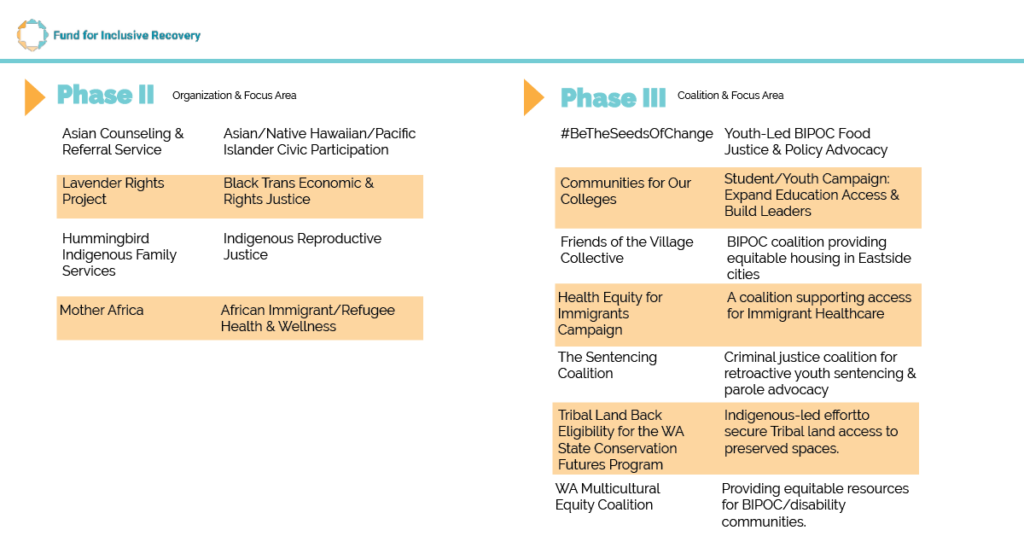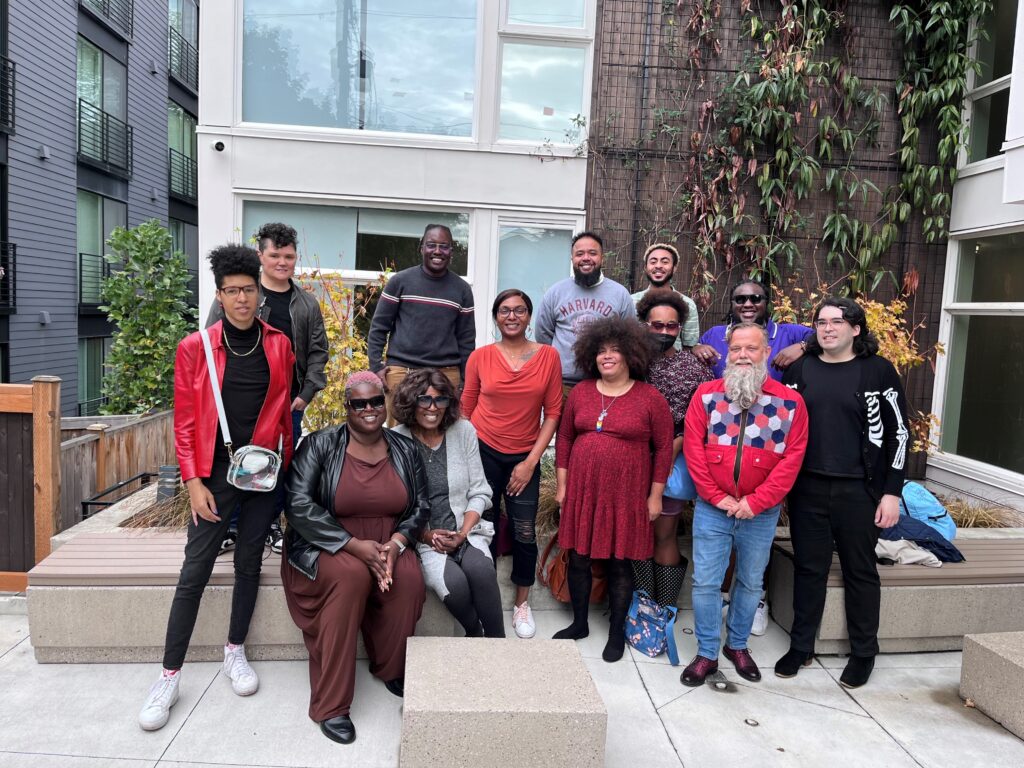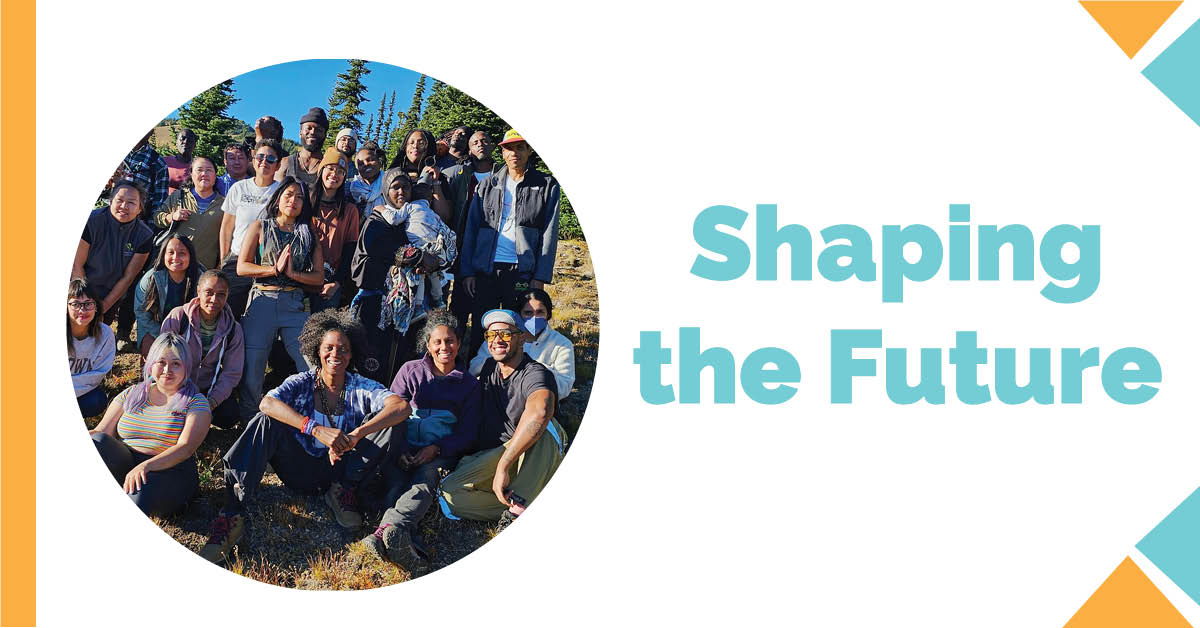Discover the inspiring organizations leading the way in Phases II and III of the Fund for Inclusive Recovery. Learn from the lessons we’ve gathered so far and find out how you can be part of shaping a more equitable future.
A Look Back
Nearly five years ago, the world came to a standstill as the coronavirus swept through communities, sparking the COVID-19 pandemic—a crisis many are still grappling with and recovering from. While everyone was affected by this unprecedented moment in history, the level of impact varied greatly from person to person.
This reality inspired Seattle Foundation to launch the Fund for Inclusive Recovery (FIR): a pooled fund designed to support those most affected. Guided by a Community Advisory Group, the Fund directs investments to Black, Indigenous, and People of Color (BIPOC) communities and organizations.
Since its inception in 2021, the Fund has played a pivotal role in advancing Seattle Foundation’s vision to foster a joyful region of shared prosperity, belonging, and justice for all who call this community home.
Five years have now passed since the first COVID-19 case was recorded in Washington State. While time has moved us further from those uncertain early days—when reliable guidance was scarce, and information felt overwhelming—we must not forget the lessons of that moment. As our nation continues to face division and rapidly shifting social landscapes, our commitment remains steadfast: to partner with our communities and support those leading the charge for systemic change.
Seattle Foundation remains dedicated to closing persistent funding gaps for organizations doing essential work to drive meaningful change. Read more to meet the grantees from Phases II and III, explore the lessons we’ve learned, and discover how you can join us on the journey ahead.
When everyone in our community has access to the resources they need to succeed, we all thrive—together.
Announcing FIR Phase II & III Grantees
In the first grantmaking cycle, the Community Advisory Group prioritized funding a diverse inaugural cohort of 20 grantees right from the start. Our Phase I grantees have made remarkable progress — securing major policy wins and adapting in the face of both significant and everyday challenges.
Following the support provided to the Phase I cohort, the Advisory Group identified additional priorities and populations to focus on in future funding phases. As a result, Phases II and III place a stronger emphasis on civic engagement, economic justice, reproductive justice, and health and wellness within several key communities.
As we move into these next phases, we are not just marking a milestone—we are laying the foundation for long-term investments that will help shape the future of philanthropy in our region.
Seattle Foundation is proud to introduce the newest Fund for Inclusive Recovery (FIR) grantees, who are driving meaningful change in their communities. Representing Phases II and III, these organizations embody the innovation, resilience, and commitment needed to address today’s most pressing challenges.
This announcement also features a special profile on the Lavender Rights Project, highlighting their groundbreaking work to strengthen legal protections and empower marginalized communities.
Over the next three years, four Phase II grantees will each receive $200,000 per year in flexible funding. Additionally, Phase III awards were granted to ten organizations: seven will receive $200,000 per year for two years to support their established policy advocacy efforts, while three will receive one-year capacity-building grants totaling $350,000. These grants aim to further enhance their efforts in building cross-community coalitions that promote justice and well-being throughout the region.

Lessons Learned
Learning and evaluation have been core pillars of the Fund for Inclusive Recovery since its inception. From the very beginning, grantees set their own progress indicators and have shared valuable lessons with Seattle Foundation on an annual basis.
Throughout the first grant cycle, Seattle Foundation facilitated focus group conversations with grantees. These sessions revealed powerful stories of base-building efforts, useful tools that have supported their work, and the progress and challenges they’ve faced along the way.
By the second year of Phase I grants, grantees reported meaningful advancements, including stronger accountability to their communities through enhanced program evaluation, improvements in organizational structure and efficiency, and a deepened sense of connection and solidarity within their networks.
At the same time, common challenges emerged—such as limited applicant pools for hiring and difficulties in gathering accurate, reliable data that genuinely reflects the lived experiences and perspectives of community members.
We are deeply grateful for the wisdom and collaboration of our Phase I grantees. Their work continues to pave the way for organizations pursuing similar goals, and their insights have been instrumental in shaping a funding framework that will extend beyond FIR.
Read the full learning report here.
A Call to Action: Join Us in Shaping the Future
Seattle is a thriving city, but its prosperity has not been shared equally. Fund for Inclusive Recovery grantees are confronting systemic challenges head-on, tackling issues ranging from housing disparities to economic inequalities. This work goes beyond charity—it’s about shifting resources and power to those best equipped to lead meaningful, lasting change.
The third phase of FIR grantees will mark the final stage of this initiative. However, FIR has sparked new ideas and innovative approaches that we are excited to pilot and implement.
As we witness the ongoing changes in the political, social, and economic landscape, we recognize the importance of going deeper, listening more attentively, and providing solutions that grantees know will be effective. Through the Seattle Foundation’s impact initiatives, we are actively working to achieve the following goals for all grantees:
- Timely and Flexible Funding: We aim to provide support that meets the emerging needs of grantees, addresses persistent underfunding, and focuses on future strategic planning for anticipated challenges.
- Trusted Relationships: Trust is essential for grantees to openly share their capacity-building needs, especially during difficult times. With this trust, we can celebrate successes and acknowledge struggles, seeking support where it is needed most.
- Ecosystem Support: Grantees operate within a nonprofit ecosystem that relies on numerous partners. By investing in trusted, community-rooted capacity-building intermediaries and collaborating across the philanthropic and government sectors, we can strengthen this ecosystem, which is vital for the health, stability, and overall well-being of Seattle and King County.
This initiative was never about temporary fixes—it has fostered real, lasting change and demonstrated the importance of supporting organizations deeply rooted in their communities.
As FIR approaches its conclusion, this is not the end of our commitment—it’s the beginning of a stronger, more effective, and data-informed approach to philanthropy. You can be part of this transformation:
- Support Our Impact Work: Your contributions help us expand these efforts and deepen our reach.
- Direct Support to Grantees: Move funds directly to FIR cohort organizations and accelerate their transformative work.
- Partner with Seattle Foundation: Join us in redefining grantmaking practices and shaping the future of philanthropy.
Stay tuned as we continue to amplify the voices of these groundbreaking organizations and share lessons learned from the FIR initiative. Together, we can create a future where every community thrives.
Grantee Spotlight: Lavender Rights Project

Lavender Rights Project was founded in 2016, and since its founding has evolved from a traditional legal clinic to an advocacy and legal services organization focused on creating whole lives for trans individuals. Their work includes legal services, housing justice, and economic justice programs.
“Consistency is incredibly important in this work,” explained Daniel Hlad. “This type of flexible, multi-year funding from Seattle Foundation helps us maintain consistency by having stable, foundational funding that we can rely on so we can continue to do this work.”
Lavender Rights Project plans to utilize the Fund’s grant to organize around harmful legislation that disproportionately impacts trans and Black communities, including measures that target unhoused people, people of color, and sex workers. They also plan to scale a guaranteed base income pilot program that supports frequently marginalized folks.
“We’re trying to change the narrative, and you can’t do that with Band Aid fixes,” said Daniel. “You have to have partnerships that are deep and long lasting.”
Lavender Rights Project has had several major wins recently, including collaborating on an innovative 35-unit permanent housing facility for members of our community experiencing homelessness or at significant risk for housing instability. The project came to fruition through $16 million in funding diverted from King County Jail, which received widespread criticism of its treatment of Black and trans people. The Sharyn Grayson House is in the final stages of renovation and expected to open in 2025.
We’re honored to support the work of Lavender Rights Project and all our FIR grantees.


